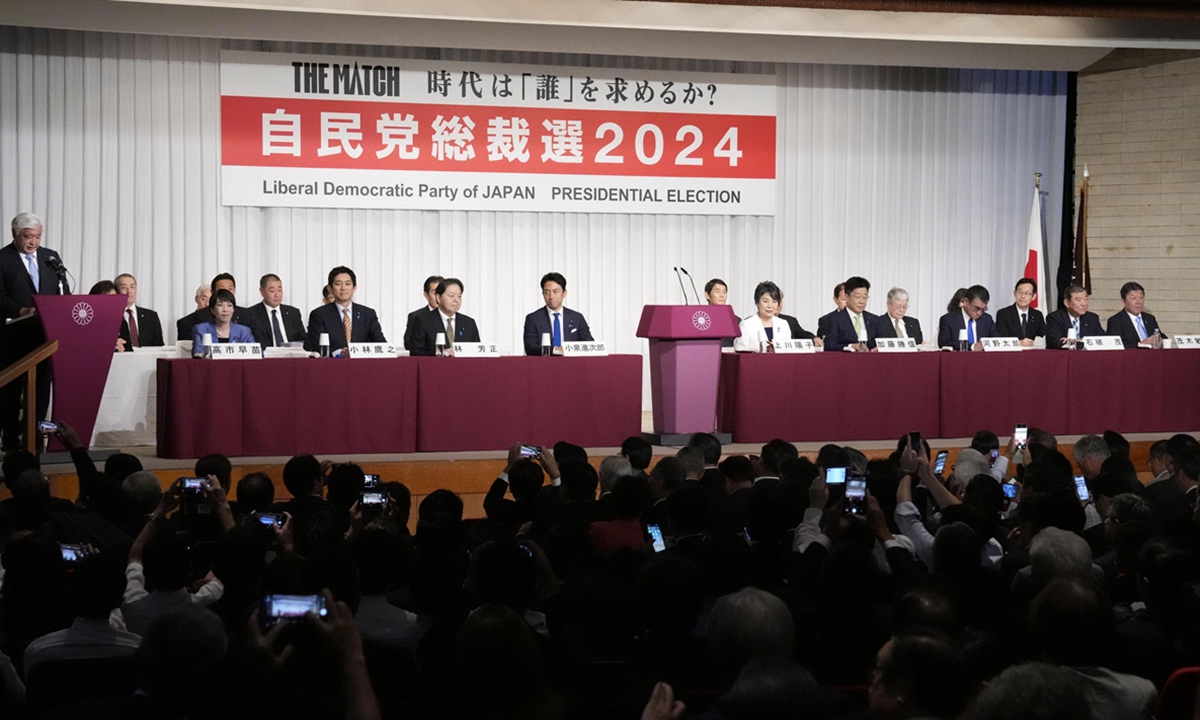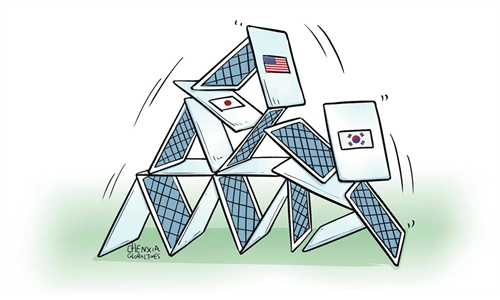
Nine candidates running in the leadership election of Japan's ruling Liberal Democratic Party, a record number under the current system, attend an event to deliver their policy speeches at the party's headquarters in Tokyo on September 12, 2024. Official campaigning for the election to choose the country's next prime minister also begins the same day. Photo: VCG
Japan's ruling Liberal Democratic Party (LDP) will elect a new leader on September 27. Since the new leader will replace Fumio Kishida as Japan's new prime minister, the unprecedentedly fierce election has attracted significant external attention. Although the outcome is still difficult to predict, various polls indicate that former environment minister Shinjiro Koizumi and former defense minister Shigeru Ishiba are seen as the hottest contenders.Whoever is elected will need to address numerous challenging domestic and international policy issues. Comparing the demands of the Japanese public with those of the LDP reveals a clear disparity. The Japanese public hopes that the new LDP leader, as prime minister, will lead Japan out of its economic and social development predicament. In contrast, the LDP is focused on eliminating the impact of political scandals by changing leadership, striving to win the upcoming House of Representatives election and maintain its ruling position.
The LDP has played an irreplaceable central role in Japan's post-war national development. However, following the political funds scandal within the LDP, public disappointment with politics in Japan has been steadily growing. A latest survey shows that 46 percent of the population does not support any political party.
Looking back on the three years of Kishida's administration, despite being proactive and progressive in the fields of foreign policy and security, the government has been inactive on economic and livelihood issues that directly affect the public's well-being. Japan's economy has failed to escape the low growth stagnation of around 1 percent, particularly with rising prices squeezing people's livelihoods, the depreciation of the Japanese yen diminishing national competitiveness, and lowering the real living standards of the populace. The Kishida cabinet's actual achievements in fulfilling its promise to increase national income have also fallen short of public expectations. These factors have become an unbearable burden that has overwhelmed the Kishida cabinet.
Following the burst of the asset bubble in the 1990s, Japan maintained overall economic and social stability. However, its standing in the international economic arena continued to decline, with its global GDP share dropping from a peak of 18 percent to the current 4 percent.
However, the LDP government has been unable to resolve these domestic development issues and it has continuously exaggerated "external threats," aggressively pursuing military expansion and breaking through the "post-war system." The policy proposals of the candidates in this election, under various versions of the guise of change, seem more like temporary measures aimed at winning votes. As for the long-term economic and livelihood issues that concern the public, there are no standout policy proposals.
In reality, since entering the 21st century, the LDP has not lacked strong leaders attempting to push for change. However, neither Junichiro Koizumi's "reform without allowing a sanctuary" or Shinzo Abe's "Abenomics," was able to eliminate deep-rooted problems or reignite Japan's development vitality. Meanwhile, Japan's external strategic thinking has become increasingly rigid and dogmatic, emphasizing ideological competition and geopolitical confrontation. Furthermore, it relies heavily on the US while pursuing a beggar-thy-neighbor policy, thereby becoming a primary driver of the "new cold war."
It is noteworthy that, impacted by the political funds scandal, the main factions within the LDP have disbanded, and the internal power structure and operational logic are undergoing profound changes. On the one hand, with the removal of factional constraints, politicians have gained greater freedom, leading to a chaotic situation in this leadership election, with intensified intra-party power struggles that may sow the seeds for future division. On the other hand, as the faction-led intra-party competition mechanism becomes ineffective, it is difficult to sustain debates over steady and orderly policy directions, and populist politics designed to attract attention may further rise. These factors add risks and uncertainties to the future direction of Japanese politics.
Considering the current political landscape and ecology of Japan, the change of the LDP leader is merely the latest iteration of the decades-long recurring "rotating leadership" pattern, and it is unlikely to bring about genuine transformation in Japan. If the new leader cannot drive Japan's political self-correction and reform with a long-term strategic vision, Japan will ultimately lose its development direction by becoming complacently stagnant.
The author is a specially appointed research fellow in the Department for Asia-Pacific Studies, China Institute of International Studies. opinion@globaltimes.com.cn



